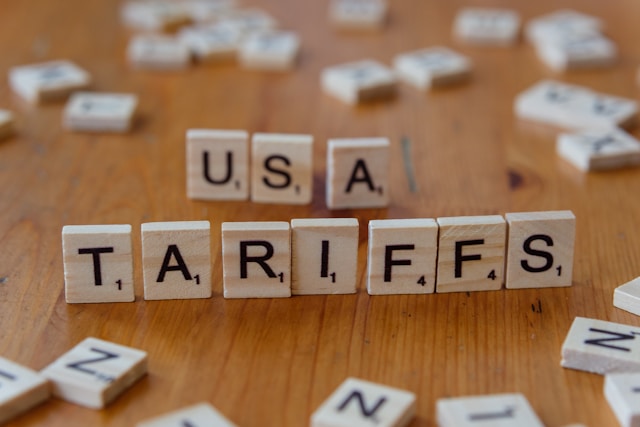
Tariffs USA – Part 6: Update
USA: The United States is permanently abolishing the duty-free threshold for all parcels arriving from around the world with a value under 800 dollars, effective immediately. According to White House trade adviser Peter Navarro, closing this “loophole for deadly drugs” is expected to save thousands of American lives. In addition, the measure will generate up to ten billion dollars a year in customs revenue for the U.S. Treasury. There will be no exceptions for trusted partner countries.
EU: The European Commission wants to implement the customs agreement with the U.S. and is proposing the abolition of tariffs on U.S. industrial goods. In return, the U.S. would retroactively lower its tariffs on cars from the EU from 27.5 to 15 percent as of August 1. The proposal is the first step in implementing an agreement between U.S. President Donald Trump and Commission President Ursula von der Leyen from July 27. According to a survey by the German Chamber of Industry and Commerce (DIHK), 55 percent consider the deal to be too much of a burden on the European economy and support a tougher stance in further negotiations. Among companies doing business with the U.S., 54 percent said they would consequently reduce trade there. A total of 3,500 companies, mostly from the industrial sector, were surveyed.
China and the U.S.: The two countries are talking again about the trade conflict that has been simmering for months. China’s trade envoy will be in Washington this week for talks with U.S. representatives, the Ministry of Commerce in Beijing announced on Thursday. The trade conflict between the world’s two largest economies, triggered by the U.S., escalated in the spring with a spiral of ever-higher tariffs and retaliatory duties. After several rounds of high-level negotiations, the introduction of most of the new tariffs in August was postponed by 90 days, leaving both sides time for further negotiations. If no results are achieved, a significant slowdown in the global economy is expected.
South Korea: The country’s central bank expects a “significant shock” from U.S. tariffs in its trade agreement with the U.S., with heavy burdens on the domestic economy due to higher duties. The central bankers predicted on Thursday that GDP growth will be dampened by 0.45 percent this year alone. By 2026, the slowdown is expected to reach 0.6 percent.
India: The doubling of tariffs on Indian goods announced by U.S. President Donald Trump took effect on Wednesday. White House trade adviser Peter Navarro confirmed this. As a result, the trade dispute between the two countries escalates further. A new punitive tariff of 25 percent, imposed because of Indian oil purchases from Russia, is now added to an existing 25 percent duty.
This raises duties on goods such as clothing, gemstones, jewelry, shoes, sporting goods, furniture, and chemicals to as much as 50 percent. This is among the highest tariff levels the U.S. imposes and is comparable to those of Brazil and China.
Brazil: President Luiz Inácio Lula da Silva used harsh words in a cabinet meeting to criticize the U.S. government’s approach in the tariff conflict with his country. Without directly mentioning U.S. President Donald Trump, Lula declared that Brazil would not accept arrogance, insults, or capriciousness from anyone. “We are ready to sit at the table as equals. But we will not be treated as subordinates,” he said. At the meeting on Tuesday, Lula and his ministers wore blue caps with the slogan “Brazil belongs to Brazilians.” Trump had recently imposed tariffs of 50 percent on a wide range of Brazilian products. Exceptions include aircraft parts, aluminum, tin, and pulp. Trump explicitly linked his tariffs to the ongoing legal proceedings against his ally Jair Bolsonaro. The former Brazilian president is currently under house arrest and must face trial for an alleged coup plot.
Indonesia: The country may secure several exemptions from the new U.S. special tariffs. According to chief negotiator Airlangga Hartarto, the understanding concerns Indonesian exports of cocoa, palm oil, and rubber, he told Reuters. On August 7, the U.S. government imposed a 19 percent tariff. A final agreement has not yet been reached, and no timetable has been set. For the exempted products there will be no special tariffs, or they will be close to zero percent.
Switzerland: The Swiss industry association for the tech sector, Swissmem, sees signs of a sharp decline in incoming orders due to the high U.S. tariffs. Orders fell by 13.4 percent in the second quarter compared with the previous quarter, the association in Bern reported. At that time, the high tariffs had not yet come into effect, but the threat had already created uncertainty. Poor business, particularly in Asia, also contributed to the decline. “We are in a dangerous downward spiral, whose pull will now be reinforced by the U.S. tariffs,” the association said. In light of the difficult business environment, nearly one-third (31 percent) of the 1,400 member companies surveyed said they planned to shift business to the EU. The survey was conducted on August 7, the day the new high U.S. tariffs came into force. For Switzerland, the U.S. has imposed one of the highest import tariff rates: 39 percent. The U.S. tariff on competing products from Germany and other EU countries stands at 15 percent. The association fears EU safeguard measures against cheap imports from third countries — which could include Switzerland. It is urging the government to quickly strengthen ties with the EU.
Sources: Live Blogs DPA, Handelsamtsblatt DE, Tamedia
Image: Unsplash

